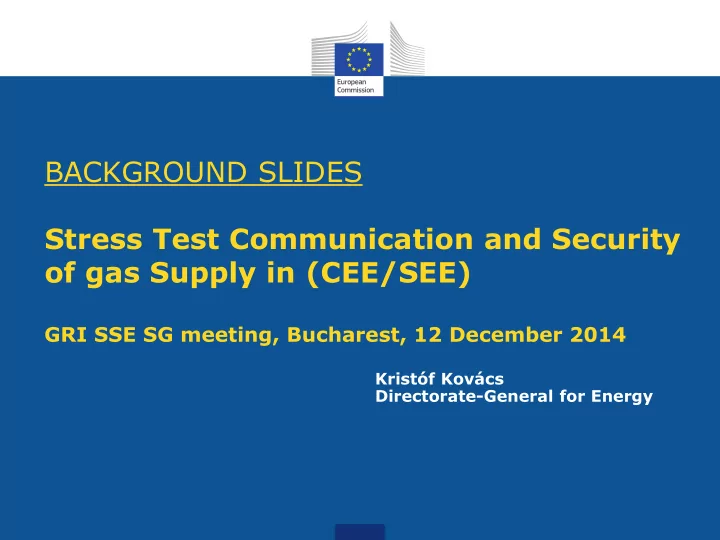

BACKGROUND SLIDES Stress Test Communication and Security of gas Supply in (CEE/SEE) GRI SSE SG meeting, Bucharest, 12 December 2014 Kristóf Kovács Directorate-General for Energy
Overview The Stress Test Exercise Impacts of a disruption of Russian flows General recommendations
The Stress Test Package • Stress Test Communication • Staff Working Documents on • South East European Focus Group • Baltics and Finland Focus Group • Energy Community Focus Group • Relations with G7 and other key third country energy partners • Report on the implementation of the SoS Regulation
The Stress Test Exercise • Aim: to ensure better preparedness in case a supply disruption would happen this winter to ensure that: • all households should be supplied with gas • any curtailments of other customers are kept to the minimum
Emanating from Commission’s European Energy Security Strategy of May 2014 – endorsed by June European Council
The approach • Involvement of nearly all Member States, the Energy Community, ENTSOs, G7, IEA, other key partners • National reports and ENTSOG on simulation of four scenarios : • 1 and 6 month interruption of Ukraine transit and all Russian supplies
The results… • First observation - progress has already been made: • Third Energy Package - better functioning internal market • Gas Security of Supply Regulation (Reverse flow, Gas Coordination Group) • New, additional infrastructure e.g. Under EEPR • Some regional work as in Baltics, BG-EL
Impacts (I) • A prolonged supply disruption would have a substantial impact in the EU, with the Eastern Member States and the Energy Community countries being affected most. • Altogether, the EU and the Energy Community Contracting Parties, excluding Ukraine, could be missing between 5-9 bcm (or 1-2 % of EU consumption) - after reshuffling their supply mix, but before taking measures
Impacts (II) • Replacement of missing volumes mostly by (costly?) LNG. Source: entsog
Impacts (III) • However, a cooperative approach among all European countries could significantly reduce the impact in the most affected countries. • For the cooperative approach, it was assumed that Member States will continue to allow gas to flow to neighbouring countries. If, on the contrary, Member States though which gas transits flow close their borders, the situation can be significantly worse.
Source: ENTSOG Source: ENTSOG
Missing gas (%) in February (6 th month) according to ENTSOG modelling of a 6-month Russian gas flow disruption in an average February and cold spell February NOTE: updated figures for RO in line with Corrigendum to be published Source: ENTSOG
Impacts (IV) • A market-based approach should be the guiding principle, with non-market measures (i.e. the release of strategic stocks, forced fuels switching and demand curtailment) only 'kicking in' when the market fails. • In a functioning market, price signals will attract new deliveries of gas, mainly LNG, and limit demand; the commercial use of storage will help ensure the demand-supply balance.
Measures (I) Source: National Stress Test Reports
Measures (II) Source: National Reports,
Measures (III) • Storage – full this year, but the next? • LNG – the capacity is there, but the price? • Demand side – but what is the potential? • Fuel switching – how long do alternative stocks last? Mitigating impacts of key measures appears surrounded by uncertainty
Conclusions • Increased cross-border cooperation can increase security of supply levels and reduce costs • Building trust on the basis of clear conditions of cooperation • Eliminating the risk of free-riding • Good examples: • Proposed EE-LT Agreement • EL-BG electricity-gas swap
Recommendations • Short term • Remove barriers to market functioning (e.g. optimizing availability and use of existing transmission and storage capacity) • Ensure implementation of the SoS Regulation (e.g. supply standard) • Coordinating measures (e.g. regional initiatives) • Mid-term • E.g. Reverse Flows Exemptions, Investment projects, More clean fuel-switching
National recommendations - Bulgaria • Sign electricity-gas emergency exchange MoU with Greece focusing on balance of interest. • Consider similar electricity-gas exchange with Turkey. • Contingency plan with cogeneration and heating sector and industry on large-scale switching. • Finalize Romania-Bulgaria interconnector • Commit to enable gas flows to the former Yugoslav Republic of Macedonia • Increase gas sector transparency and expedite implementation of internal market rules affecting trade. • As a last resort, European Commission to consider short- term special derogation from environmental legislation to Varna coal-fired power plant.
National recommendations - Greece • Sign electricity-gas emergency exchange MoU with Bulgaria focusing on balance of interest. • Contingency plan with cogeneration and heating sector and industry on large-scale switching. • Develop economic security of supply contingency plan. • Consider agreement with Turkey to secure gas supplies also in case of a supply disruption.
National recommendations - Romania • Define protected customers in line with Security of Gas supply Regulation • Finalize Romania-Bulgaria interconnector • Cooperate with Moldova on conditions under which gas supplies on main network can take place • Investigate Romanian system options to increase throughput of Hungary-Romania interconnector • Publication of storage data by Romgaz on Gas Storage Europe transparency platform
National recommendations - Hungary • Increase transparency in the energy sector • Commitment to resolve testing-related issues on Slovakia- Hungary pipeline allowing commissioning in 1 January 2015 • Agreement with bordering countries allowing full use (receipt and sending of gas) of interconnectors under market conditions and on the basis of solidarity principle in a security of supply emergency. • In this regard, implement expediently security of supply- related aspects of intergovernmental agreement with Croatia enabling also reverse flows into Hungary
National recommendations - Croatia • Reassess high share of protected customers • Implement expediently security of supply-related aspects of intergovernmental agreement with Hungary enabling also reverse flows into that country
26th Madrid Forum 15 October 2014 thank you for your attention
Recommend
More recommend